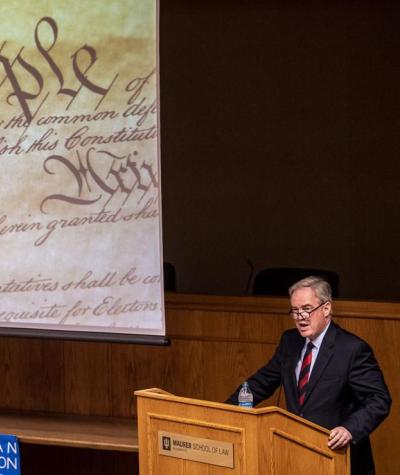I came to Washington to work in the Reagan Justice Department and have spent much of my career in Republican circles. I was a lawyer for the presidential campaign of President George H.W. Bush, — a Republican Commissioner on the Federal Election Commission (FEC) and as a long-time advisor and campaign legal counsel to Sen. John McCain.
But I’m finding some of the conservative attacks on Judge Ketanji Brown Jackson’s jurisprudence hard to swallow. They are at best rote and often downright hypocritical. They suggest that Republican appointees to the Supreme Court and other federal courts are principled practitioners of “judicial restraint” while Democratic appointees reach out to make social policy.
Today, the “conservatives” are often the radicals, ignoring constitutional and statutory language they don’t like and acting in practice like the super-legislators they criticize in theory.
In a recent Op-Ed by The Washington Post, “Republicans are right to oppose Ketanji Brown Jackson,” commentator Henry Olsen repeats some of the familiar lines about what conservatives claim to think about the Constitution.
Specifically, Olsen claimed “Democrats favor the court expanding its jurisdiction into political matters; Republicans favor a restrictive view, generally deferring to democratically elected bodies at all levels of government rather than making the Court the final arbiter of public policy.”
That has a fine philosophical ring but is the opposite of what the current conservative majority on the Supreme Court has done in multiple cases involving campaign finance and voting rights – two areas to which I have devoted much of my career.
In reality, justices appointed by Republican presidents have exhibited deference to Congress and other elected bodies only when they agree with their policy preferences and repeatedly overrule those democratically elected representatives when their policy decisions conflict with the justices’ preferred outcomes.
For instance, in Citizens United v. Federal Election Commission (FEC), it was the conservative justices who overturned almost a century of both federal and state limitations of corporate money in elections, which has led to huge increases in political spending, much of it from secret sources, enabling special interests to buy favor and dictate legislative outcomes.
They helped further increase the flood of money into our elections four years later in McCutcheon v. FEC, striking down a congressionally enacted law and removing the $117,000 cap on overall contribution limits for individuals.
It is this same faction of justices who have repeatedly weakened the protections of the Voting Rights Act — an act passed by Congress, pursuant to explicit language in the 15th Amendment.
While they claim to be “strict constructionists” adhering to the goals of the “founders,” they have picked and chosen which of America’s forefathers they cite, ignoring the authors of the 14th and 15th amendments who, in following the Civil War, thought they were guaranteeing a strong federal role to protect minority voting rights and ensure legal equality in every state.
Instead, the “conservative” justices have repeatedly expressed skepticism that Congress knew what it was doing or could have meant what the law says and stepped in to rewrite and narrow these crucial statutes protecting fundamental Constitutional liberties. These are the actions not of “judicial restraint” that conservatives laud but of the result-oriented jurists they claim to deplore.
It is fair for senators to evaluate a nominee’s jurisprudence, but they should not hold her to a false standard of supposed conservative deference to constitutional text and legislative decisions, and we should not pretend that there is a clear, partisan line on who holds a more restrained judicial philosophy.

